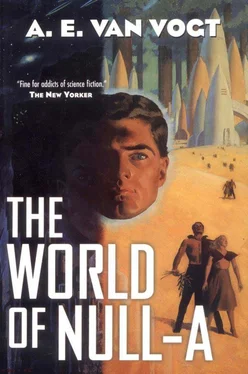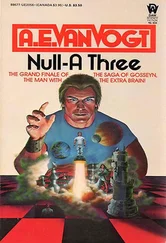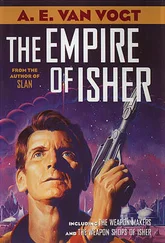Slowly, Gosseyn climbed back to the second floor. There was a picture in his mind, a picture of himself cut off here on this mountain. Cut off physically and by the mystery of himself. It was a dark inward world at which he gazed. He felt depressed and tense. The idyl was over.
His belief that he was in control of the situation was meaningless in the face of what had happened to the videophone.
Somewhere out there the forces that had put him here were waiting. For what?
Gosseyn climbed slowly up the stairs. At the top he stopped to collect his thoughts. His plan for an easy departure had failed. He visualized the potentialities. He would get some information and then leave on foot as quickly as possible.
The decision braced him. He turned to go into the bedroom, but paused as the voice of Prescott came.
“What I don't understand is what happened to the video.”
His wife sounded thoughtful. “It can only be one of two things. An interference screen has been set up between here and”–Gosseyn did not catch the name–“or else there's a fault in the machine itself.”
“But isn't there supposed to be automatic warning long before anything is worn out, whereupon a repairman comes along and fixes it up?”
Gosseyn waited for the woman's reply to that. It was hard for him to believe they knew nothing about it.
“That's the way it's always been,” said Amelia Prescott. “It seems very strange.”
Gosseyn forced himself to wait for further comment. When none was made, he tiptoed hurriedly down the stairs, then came up again, noisily this time. The delay strained his patience, and, since he wasn't sure that the pretense would serve a useful purpose, he made up for lost time the moment he entered the room.
“Where,” he asked, “do you keep your maps of Venus?”
Prescott did not reply, but his wife shrugged and said, “They're in a cupboard in the laboratory.” She described the location of the cupboard.
Gosseyn remembered having looked into it. He hurried down into the basement and dug out three maps. Upstairs again, he spread them out on the floor and knelt beside them. He had seen maps of Venus before, but it was different being there. Besides, these were more detailed. Gosseyn looked up.
“Will you show me where you are on one of these things?”
The woman said, “We're on the one marked 'Three,' on that central mountain range. I once put a little mark showing our approximate location. It's probably still there.”
Gosseyn found it about four hundred miles north of the city of New Chicago.
“Oh, there's ample fruit,” she said in answer to his next query. “Purple berries an inch in diameter by the billion, a large yellow fruit, a bananalike juicy fruit, reddish in color. I could name a dozen others, but those are available the year round. They'll see you through any trip that you can possibly make.”
Gosseyn studied the woman's face thoughtfully. Finally, he reached over and touched the lie detector. It said, “That's the way it is.”
He turned back to Amelia Prescott. “You're convinced I'll be captured?” he asked. Briefly, he was intent. “Is that it?”
“Of course you'll be captured.” She was calm. “We have no police system on Venus, and no ordinary crimes. But the cases requiring detective work that come up are always solved with extraordinary speed. You'll be interested in meeting a null-A detective, but you'll be shocked by the swiftness which you are captured.”
Gosseyn, whose main purpose was to contact Venusian authorities, was silent. He felt torn. His impulse now was to leave immediately. The sooner the concealing vastness of the mighty forest closed around him, the safer he would be. But Amelia Prescott's complete misunderstanding of the situation drew her character into sharper focus.
She was innocent. She was not a member of the gang. That seemed clear now.
Conversely, her husband's silence was abnormal. Thinking about it, Gosseyn felt himself change color. Until this moment he had taken it for granted that he was not recognized. Prescott had not been one of those present at the palace of the Machine on earth. But suppose the man had been shown photographs.
It changed things. He had decided earlier to give no explanations. But if Prescott knew him, then silence might make the man suspect that he himself was known.
On the other hand, it would be folly to identify himself as Gilbert Gosseyn if he didn't have to. He stood up. And then once more he hesitated. Abruptly he knew he couldn't depart without telling the woman. If anything happened to him, then she at least would know.
Through her the whole of Venus might be warned of the hideous danger that threatened. Telling her would be risky for her too, but Gosseyn had a plan for that. He would leave the decision about her husband up to her.
Gosseyn sat down on the edge of the bed. Now that he had made up his mind, he felt cool and unshakable. His nerves were steady as lead, that stable element. Ostensibly, then, he addressed himself to both the man and the woman. Actually, only the woman interested him. After a little more than a minute, Prescott rolled over and studied his face. Gosseyn pretended not to notice.
Twenty minutes later he let his voice lapse into silence. In the bright light that glared in through the wall window, he saw that Prescott's eyes were fixed on him.
“I suppose,” the man said, “you realize your story has a basic flaw.”
The man seemed to have forgotten his long silence, and Gosseyn accepted casually his entry into the conversation.
“My story,” he said, “is true according to my memory. And any lie detector will bear out every word of it. That is, unless–” He paused, smiled bleakly.
“Yes?” Prescott urged. “Unless what?”
“Unless all the memory I now have is of the same category as my earlier belief that I had been married to Patricia Hardie, but that she had died, leaving me grief-stricken.” He broke off sharply. “What is this flaw you have detected?”
The answer was thalamically prompt. “Your identification of your present self with the Gosseyn who was killed. Your complete memory of that death, the way the bullets and the energy struck you and hurt you. Think about that. And then think of the underlying credo of null-A, that no two objects of the universe can be identical.”
Gosseyn was silent. Through the window, trees taller than the tallest skyscrapers towered toward a blue haze of sky, and a swift river flowed through an evergreen world. Strange and tremendous setting for a conversation about the structural nature of things organic and inorganic, things molecular, atomic, electronic, neural, and physico-chemical, things as they were. He felt a deep wonder. Because he didn't seem to fit into that universe. A score of times since his awakening, he had thought of the very objection that Prescott was now making.
He was a man who claimed not merely similarity of structure but identification with a dead man. In effect, he was maintaining that because he had the memory and general physical appearance of Gilbert Gosseyn I, he was Gilbert Gosseyn I.
Any student of philosophy, even in the olden days, knew that two apparently identical chairs were different in ten thousand times ten thousand ways, none of them necessarily visible to the naked eye. In the human brain, the number of possible paths that a single nerve impulse could take was of the nature of ten to the twenty-seven-thousandth power. The intricate patterns set up by a lifetime of individual experience could not ever be duplicated. It explained beyond all argument why never in the history of Earth had one animal, one snowflake, one stone, one atom ever been exactly the same as another.
Читать дальше










